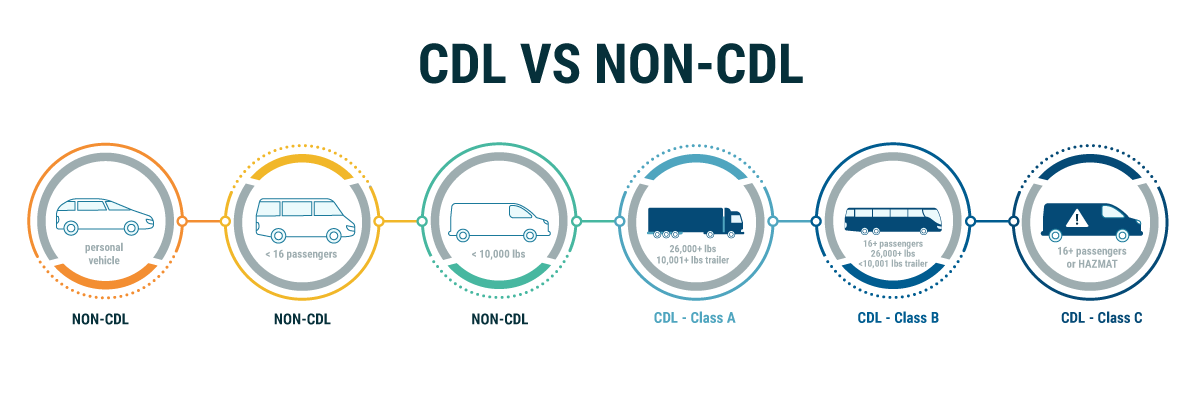For employers who hire non-CDL drivers, compliance with Department of Transportation (DOT) regulations is crucial. These regulations stipulate that specific driver records must be maintained, including Motor Vehicle Records (MVR) checks, physical examinations, and safety history documentation. Adhering to these requirements helps ensure that drivers meet the necessary qualifications to operate commercial vehicles safely. Non-compliance can lead to significant consequences, such as fines, warnings, and other penalties. In this article, we'll explore the key DOT requirements for non-CDL drivers, the distinctions between CDL and non-CDL drivers, and the essential components of a compliant background check process.
What is a Driver Qualification File (DQF)?
A Driver Qualification File (DQF) is a record that employers must maintain to verify that a driver is qualified to operate a commercial vehicle. The DOT mandates that employers keep DQFs for both CDL and non-CDL drivers who operate commercial motor vehicles with a gross vehicle weight rating (GVWR) between 10,001 and 26,000 pounds. DQFs include:
- Driver's employment application
- Safety performance history from previous employers
- MVR
- Road test certification
- Proof of a physical examination
- Records of alcohol and drug testing inquiries
- Documentation of annual review of driving record
What is a Commercial Driver’s License (CDL)?
A Commercial Driver's License (CDL) is required for individuals who operate vehicles over 26,000 pounds, transport hazardous materials, or carry more than 15 passengers. CDL requirements are rigorous, including specialized training from a registered training provider and passing both skills and knowledge tests as per Federal Motor Carrier Safety Administration (FMCSA) standards. Although the DOT sets the standards for CDLs, individual states issue the licenses.
What’s the Difference Between a CDL and a Non-CDL Driver?

CDL (Commercial Driver’s License) drivers are categorized into three classes—Class A, B, and C—based on the type and weight of the vehicle they operate. Class A licenses are required for drivers operating combination vehicles where the tractor’s weight exceeds 26,000 pounds and the towed trailer weighs over 10,000 pounds, such as in the case of tractor-trailers. Class B licenses are for operating single vehicles over 26,000 pounds or a vehicle combination where the trailer weight does not exceed 10,000 pounds; this class typically includes buses and large delivery trucks. Class C licenses are primarily used for vehicles that don’t fall under the Class A or B definitions but require a CDL because of specific endorsements, such as for transporting hazardous materials (HAZMAT) or carrying 16 or more passengers.
In contrast, non-CDL drivers generally operate smaller vehicles, like light delivery vans, small trucks, or passenger vehicles, which do not exceed certain weight or passenger limits. While non-CDL drivers do not need a commercial driver’s license, they may still be subject to regulation under DOT rules, especially if their vehicle combination exceeds 10,000 pounds and involves interstate commerce. It's important to note that the classification of licenses for non-CDL drivers is not standardized across all states. While some states may use similar designations to the CDL classifications (A, B, or C), others have different systems. For example, Florida uses a Class E license for regular vehicles, and states like Louisiana and Michigan require a Chauffeur's License for operating certain commercial vehicles. These variations mean that employers need to be aware of the specific licensing requirements in each state where their drivers operate.
DOT Regulations for Non-CDL Drivers
The FMCSA outlines several regulations that employers must follow when hiring non-CDL drivers:
- Employment Application: Employers must maintain detailed employment applications for non-CDL drivers, listing past employers, driving violations, accidents, and other relevant information from the past three years.
- MVR Checks: Employers must conduct an MVR check within 30 days of a non-CDL driver’s hire date and annually thereafter. This check covers the driver's record for the past three years in all states where they held a license, ensuring the driver meets minimum safety standards and identifying any disqualifying offenses.
- Physical Exam: Non-CDL drivers are required to undergo a DOT physical examination every two years to ensure they are medically fit to operate a commercial vehicle. This examination must be conducted by a certified medical examiner listed in the National Registry of Certified Medical Examiners.
- Safety Performance History: Employers are required to obtain the safety performance history of a candidate from their previous employers covering the past three years. This record should include details about accidents, any substance abuse violations, and general driving behavior.
- Drug and Alcohol Testing Inquiry: Employers must inquire if candidates have ever failed or refused a drug or alcohol test within the past three years. Candidates with positive results or test refusals must complete a return-to-duty process before resuming any safety-sensitive roles. It’s important to note that FMCSA drug testing is not permitted or required for non-CDL required drivers.
- Road Test Certificate: Non-CDL drivers must pass a road test, and the certification must be kept in their DQF. A road test certificate issued within the last three years may suffice to meet this requirement.
- Record of Duty Status: Non-CDL drivers operating commercial vehicles must maintain a logbook documenting each trip's details. However, those who qualify for a short-haul exemption may be exempt from ELD requirements. A record of duty is not required within the DQ file; correct Record of Duties can be maintained elsewhere.
Key DOT Regulations for Employers
Employers need to be well-versed in several DOT regulations, particularly those related to maintaining DQFs for non-CDL drivers operating vehicles with a GVWR between 10,001 and 26,000 pounds. These files must be kept for the term of employment and then three years from termination and include various documents verifying a driver's qualifications and safety history. Some documents within these files can be removed after 36 months, such as annual MVR's (a new hire MVR is required for the life of the file and 36 months from termination), documented annual reviews, and physical exams. While the DOT does not mandate drug testing for non-CDL drivers, employers can implement their drug testing programs.
Moreover, employers must adhere to drive time regulations, which generally require breaks after specific driving periods and limit the total driving hours for all regulated drivers (CDL and non-CDL). Non-CDL drivers operating within a 150-air-mile radius with the same start and end point may qualify for a short-haul exemption which allows for time record in lieu of ELD.
What Can DISA Do?
Ensuring compliance with DOT requirements for non-CDL drivers is essential for maintaining safety standards and avoiding penalties. Employers must remain diligent in maintaining proper records, conducting regular checks, and staying up-to-date with DOT regulations. DISA Global Solutions offers comprehensive services tailored to meet DOT compliance needs. From MVR checks and employment verification to drug testing and physical exams, DISA provides customizable packages to support your compliance efforts while adhering to local, state, and federal regulations. By partnering with DISA, you can ensure your non-CDL drivers meet all necessary requirements, helping to maintain a safe and compliant workforce.
Related Articles
About DISA Global Solutions
Founded in 1986, DISA is the industry-leading provider of employee screening and compliance services. Headquartered in Houston, with more than 35 offices throughout North America and Europe, DISA’s comprehensive scope of services includes drug and alcohol testing, background screening, occupational health, and transportation compliance. DISA assists employers in making informed staffing decisions while building a culture of safety in their workplace.


